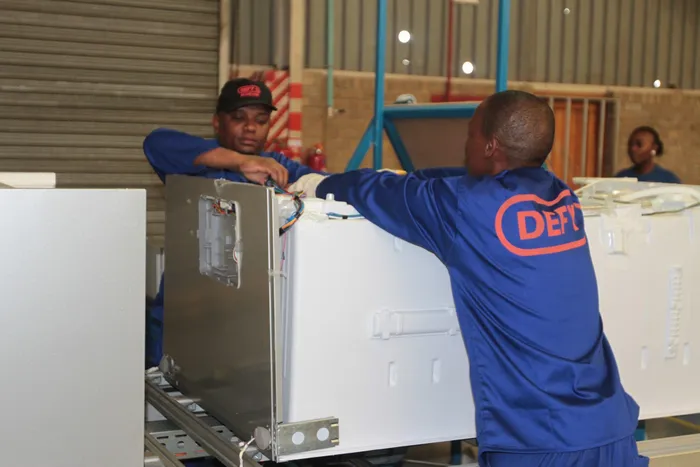Whirlpool and Defy merged entity to spend 50% on local suppliers

Workers at the Defy refrigerator manufacturing plant in East London wire a fridge. File picture
The merged entity between major domestic appliance manufacturers Beko Europe and Whirlpool Corporation has committed to supporting local suppliers by spending up to 50% of its procurement bill with local providers of raw materials and other inputs.
In South Africa, Beko supplies non-branded major domestic appliances to private label suppliers and other manufacturers. Whirlpool, on the other hand, supplies Whirlpool-branded home appliances to the South African market.
Marsha Govender, who is director for the commission for legal and compliance at Defy, said yesterday that the merged entity would boost local procurement from 30% to 50%.
“We can confirm the 30% commitment and how we intend to draw that up to the 50% mark. And we can attribute our end value to that,” said Govender.
However, the two companies could not provide details about their current spend in South Africa, responding to Competition Commission queries that “due to the nature of the relevant markets and investment projects which they require, that require know-how and skills” they could not “commit to a specific percentage for now” on local spend.
Nonetheless, the merged entity, which will continue to manufacturer and distribute Defy and other brands, “will aim to support” local suppliers “where possible, and report back on these investments” in its annual report.
Jerome Wilson, a legal representative for the merging entities, told the hearing that after the deal, “the manufacturing of those products now will be under the control” of the group in Europe although there would be no “changes in respect of price positioning” in South Africa.
Citing analysis from the Competition Commission of South Africa, Wilson said “Defy and the Whirlpool brands are positioned differently from a pricing perspective” in South Africa. Defy was more “prominently positioned in the lower price segments (with) Whirlpool in the higher price” segments.
The two brands also had a significant number of competitors in the particular segments, which means that “there was no hard segmentation” between the different price categories.
“If you have a significant number of competitors in the price points, the question is more one of emphasis and weight, and it is in that respect that there is a pricing closeness of competition difference between these two brands, and that’s why you have seen a number of the retailers indicating that this transaction does not cause any particular concern to them.”
The Competition Commission, which assesses proposed large mergers before referring such to the Tribunal for a final decision, has already recommended that the transaction be approved subject to public interest conditions.
One sticking issue was the positioning of products in large retail outlets, with the hearing seeking to understand if there would be no preferential treatment for one brand over the others.
However, given the large nature of the retailers used by the merged entity, the hearing was told that suppliers and retailers were mainly concerned about route to market and distribution advantages.
“Much of these retailers are large in nature. They are large retail chains and the suppliers obviously want some form of route to market, so some form of distribution, which is what this retail is about.”
Despite continuing to face economic challenges, higher interest rates that have resulted in elevated inflation and resultant suppressed consumer spend, South Africa’s home appliances market has “become an essential part of modern lifestyle”, analysts say.
“The South Africa home appliances market is expected to register a compounded annual growth rate of greater than 5% during the forecast period 2024 to 2029. On average, the South African household owns five appliances,” noted the latest research by Mordor Intelligence.
Population growth, technology infiltration and people’s improving lifestyle trends are some of the critical factors seen as driving purchase decisions of home appliances in the market.
Moreover, South Africa is deemed to have a low level of value and volume of home appliances, but it is expected to be one of the fastest-growing markets in the future. Issues related to energy and water utilisation by major appliances “remain apparent” in various categories of home appliances in South Africa.
BUSINESS REPORT